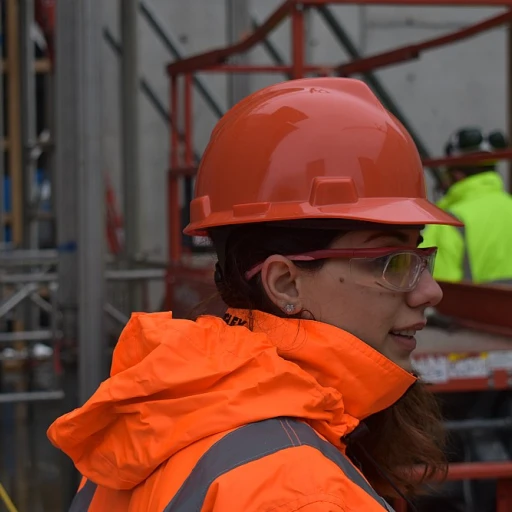Understanding Behavioral Assessments
Decoding Behavioral Assessments
Behavioral assessments are giving tech hiring a new flavor. But what exactly are they? Think of them as a spotlight on how potential employees play in the sandbox, aiming to reveal their problem-solving antics, communication quirks, or leadership chops. Forget the resumé polish; this digs below the surface of tech skills, focusing on how a candidate will perform when the chips are down.
Let’s face it, while coding skills matter, nailing team dynamics and adapting to changes often weigh more in tech environments. Here's where these assessments help the hiring process—by focusing on the candidate personality and predicting how they'll fit the company culture. And it’s not just about getting along with future team members. These tests give insight into job suitability, from customer service roles to problem-solving gigs, beyond what typical interviews offer.
From personality tests like the Enneagram to multiple choice assessments, companies can leverage these tools to ensure they’re not just hiring an employee, but a long-term team player. It’s about making informed hiring decisions, reducing the guesswork and, potentially, the turnover rate. The role of behavioral assessments goes beyond hiring; it’s about shaping a cohesive and productive work environment.
Sources:
Dice Insights on Behavioral Assessments,
SHRM on Behavioral Assessments and Hiring
Why Behavioral Assessments Matter in Tech
The Importance of Personality in Tech
In the tech world, understanding a candidate's technical skills is just one part of the equation. But how do you know if they'll fit into your company's culture or work well with your existing team? Behavioral assessments prove to be a powerful tool in predicting how a potential hire will blend in, but also thrive. These tools tap into candidate personality traits, nudging hiring managers closer to building cohesive, powerful teams. It’s about finding the right people, not just filling positions.
Driving Better Hiring Decisions
For decision-makers in tech, diving into the pool of candidates can feel overwhelming. But behavioral assessments step up as a lifebuoy. These tests provide insights into how a candidate will perform under pressure—an important aspect in meeting tight project deadlines or managing fast-paced environments. Questions like situational judgment tests or multiple-choice quizzes focused on problem-solving offer glimpses into how candidates think and operate, which influences hiring decisions profoundly.
Building Strong Teams
Strong teams don't just happen. They are a result of smart recruiting, and behavioral assessments are a key player in that process. By focusing on interpersonal skills, teamwork, and customer service orientation, these assessments help predict how a new hire might interact with current team members. Well-implemented tests might even utilize types behavioral frameworks like the Enneagram test to delve deeper into candidate personality, enabling you to build teams that communicate effectively and collaborate seamlessly.
Long-term Employee Success
One of the main benefits behavioral assessments offer is their ability to guide you toward candidates who are more likely to succeed and stay long term. Companies investing time to understand candidates' personalities see improved retention rates. It's about nurturing relationships within the company, rather than just onboarding new faces. When a tech company finds the right fit, they notice higher employee engagement, satisfaction, and performance, saving precious time and resources in the long run.
Key Components of Effective Behavioral Assessments
Important Elements of Behavioral Assessments
When you're bringing new members into your company, understanding who they are beyond their resume can make all the difference. Behavioral assessments are a treasure trove of insight, diving right into the candidate's personality and core values. But, what makes these assessments a powerful ally in the hiring process? Let's break it down.
More Than Just Words and Numbers
Behavioral assessments help you peek into the candidate's world without them even realizing it. These assessments use questions designed to reveal how a candidate will perform in potential scenarios, bringing a level of objectivity into interviews. Imagine standing face-to-face with a seemingly perfect candidate, only to find out later that their skills and personality weren't aligned with your company's goals or culture. Assessment tools can save you from this mismatch.
The Role of Personality and Skills
In a world dominated by technical roles, focusing solely on technical skills can often overshadow the importance of softer, interpersonal skills. Behavioral assessments come into play by evaluating candidates' problem-solving abilities, their capacity to work in a team, and even their approach to customer service. This means going beyond checking the boxes on job-specific skills. A well-rounded employee doesn't just excel alone but lifts the entire team. These tests can reveal real gems among candidates who might otherwise be overlooked.
Types of Tests That Can Help
- Multiple Choice Tests: A sneak peek into a candidate's quick thinking and preferences.
- Enneagram Tests: Gives a taste of their core values, motivators, and areas of growth.
- Situational Questions: These put candidates on the spot to see how they'll react in real-life job scenarios.
Being able to predict how someone will perform in future roles isn't just guesswork when you rely on behavioral assessments. And remember, the value of these assessments can further increase when integrated with skill-based evaluations, offering a comprehensive view of a candidate. If this has piqued your interest, you might want to dig deeper into
enhancing recruitment with skill-based evaluations.
These components don’t just help in sizing up a candidate; they're fundamental indicators of how well these potential hires will mesh with your company culture and contribute to long-term success. Always remember that hiring is as much about the present needs as it is about building a robust future.
Implementing Behavioral Assessments in Your Hiring Process
Bringing Behavioral Assessments to Life in Your Hiring Strategy
The art of hiring has evolved, and implementing behavioral assessments is like finding that secret ingredient in your grandma’s famous recipe—it just makes everything better. Look at it this way: you're not just hiring skills on paper; you’re looking to unveil the heart and mind behind the talent.
Introducing these tests to your hiring approach can feel like learning a new dance. It’s about balance, rhythm, and a bit of flair. The aim is to fit the steps into your existing routine without stepping on anyone’s toes or complicating the moves.
Start Simple with the Right Questions
Get started by shaping questions that fit your company’s culture and the role. Think about what makes a great team member and the personality traits that will vibe with your crew. Are they a natural problem solver? Do they value teamwork like family? Consider including assessment tests like the Enneagram or multiple choice personality insights to explore those areas.
Collaboration with Your Team
Remember, your hiring process is a team sport. Sit down with your main players—HR, team leads, and even a few current employees. Discuss which types of behavioral assessments help you gauge the traits crucial for the role. You’d be surprised how a casual brainstorm can yield golden insights.
Integrate Assessment Tests Early
Slot these tests into your hiring process sooner rather than later in the screening phase. This step can help you sift through candidates efficiently, bringing to the fore those who click with your company’s needs and long-term goals.
Personalize Your Approach
One size does not fit all. Every job opening might require a tweak here and there in the assessment content. Customizing questions and test formats for particular roles can fine-tune your process to evaluate whether a candidate will not only perform well but also thrive as part of your team.
Refine and Reflect on Your Process
Think about each hire as a mini case study. Reflect on the assessment choices once a candidate joins the team. Check if predictions about their performance and team fit held true. This cycle of learning and adjusting will sharpen your hiring decisions over time.
Implementing behavioral assessments doesn't mean overhauling how you hire. It’s about enriching the process to spot top-notch talent that feels right, not just looks right on paper. When you get it down, you can pretty much guarantee smooth sailing in making fulfilling, impactful hires.
Case Studies: Success Stories in Tech Hiring
Real-life Win Stories in Tech Hiring
The tech industry is brimming with tales of success thanks to the strategic use of behavioral assessments. Look at Acme Tech for example, which faced the challenge of finding the right blend of technical and interpersonal skills in candidates for their customer service tech support role. Rather than relying solely on traditional interviews or coding tests, Acme incorporated a mix of personality and problem-solving assessments into their hiring process.
They discovered, through behavioral tests like the Enneagram, that candidates who performed well in multiple-choice scenarios tended to exhibit strong analytical skills and empathy—traits that were crucial for their job. This assessment help tipped the scales in favor of candidates who would genuinely thrive in their company culture and contribute significantly over the long term.
Jumping over to BetaSoft Technologies, they unearthed a treasure trove of potential by revamping their hiring process to include not just technical drills but also situational behavioral evaluations. They found that by identifying team members who were resilient problem-solvers ahead of time, productivity soared and employee satisfaction followed suit.
Reliable evidence, as highlighted by consultancy group McKinsey & Company, indicates that using behavioral assessments can increase the likelihood of selecting great hires by up to 24% (source: McKinsey & Company).
Whether it's tackling high employee turnover or aiming for higher team synergy, these companies illustrate how behavioral assessments are more than a passing trend—they're powerful tools for making informed hiring decisions. Helping companies align potential employee personalities with roles fosters a more harmonious and effective workforce.
It's clear from these seasoned stories that when used thoughtfully, the benefits of behavioral assessments in hiring shine bright. As businesses evaluate their methods, they might just find that behavioral assessments are the puzzle piece they need to perfect their recruitment strategy.
Future Trends in Behavioral Assessments for Tech
Analyzing the Future of Behavioral Assessments in Tech Hiring
The future of behavioral assessments in the tech hiring process is a topic filled with potential, and it's one we all are closely watching. As hiring managers and team leaders, the desire to find the best in class candidates drives us to innovate our methods. Let's look into how behavioral assessments will continue to shape the landscape of tech recruitment.
As the tech sector continues to expand, so does the array of roles within it, demanding varied skills beyond just technical prowess. Understanding how future team members fit into your company culture and how they handle challenges is just as important. Behavioral assessments help decode these attributes and more.
We see a trend towards more personalized and interactive assessment formats. With candidates increasingly valuing a positive candidate experience, tools like gamified assessments and virtual simulations are stepping into the spotlight. These methods not only reduce the stress associated with more traditional multiple choice tests but also give a realistic preview of how a candidate will perform in real-life scenarios.
Additionally, the role of AI and machine learning in improving the accuracy and bias reduction of these assessments is growing. Though not without controversy, AI can offer predictive insights into a candidate’s longevity and success within a role, potentially reducing turnover rates. However, it's essential that we remain vigilant about ensuring these technologies are used ethically and avoid systemic biases.
Something we can’t overlook is the candidate’s personality. With trends suggesting that emotional intelligence and adaptability are becoming as valued as technical skills, assessments that gauge these traits are likely to see increased adoption. Using personality-focused tests like the Enneagram can provide insights into how candidates approach problem solving and team dynamics.
Also, as hiring becomes more global, assessments tailored for cultural fit are increasingly relevant. When developing behavioral assessments, it’s vital to consider the diverse backgrounds of tech candidates to ensure inclusivity and fairness.
The importance of adaptability is clearer than ever. Whether it’s understanding emerging assessment tools or acknowledging changing industry priorities, staying ahead in tech hiring means continuously evolving your processes. The companies that thrive will be those that not only find the right candidate but integrate these assessment insights into long-term employee development strategies, creating a more robust and versatile team.
Stay tuned to see how these trends unfold. For now, these insights are set to reshape how we see behavioral assessments playing a pivotal role in future tech hiring, ensuring that the right candidates are not just hired, but grow to become integral parts of their tech teams.



